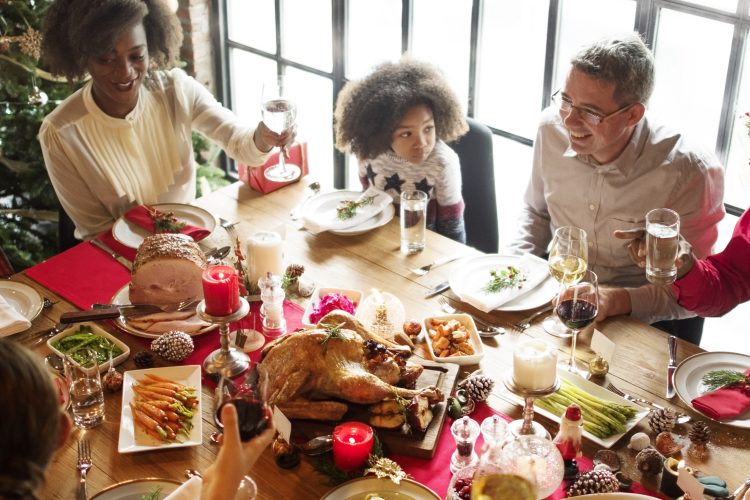Staying food allergen safe this festive period
- Like
- Digg
- Del
- Tumblr
- VKontakte
- Buffer
- Love This
- Odnoklassniki
- Meneame
- Blogger
- Amazon
- Yahoo Mail
- Gmail
- AOL
- Newsvine
- HackerNews
- Evernote
- MySpace
- Mail.ru
- Viadeo
- Line
- Comments
- Yummly
- SMS
- Viber
- Telegram
- Subscribe
- Skype
- Facebook Messenger
- Kakao
- LiveJournal
- Yammer
- Edgar
- Fintel
- Mix
- Instapaper
- Copy Link
Posted: 18 December 2023 | Grace Galler | No comments yet
Allergen expert Dr. Helen Evans-Howells shares tips on how those living with food hypersensitivity and their loved ones should approach allergen safety during the holiday season.


The festive season is upon us, and to ensure that those living with food hypersensitivity avoid threats from festive food and drinks, Dr. Helen Evans-Howells, GP and Allergy Specialist has compiled a list of food safety tips to keep in mind when celebrating with family and friends.
For people living with severe allergies, festive foods and drinks can serve as “the biggest threat”, according to ready2reactuk. In fact, it has noted that “young adults the most at risk from severe and fatal allergic reactions to foods”.
One in four people in the UK being affected by food abounds and allergies at some point in their lives, and ready2reactuk has carried out a survey revealing a quarter of respondents living with severe allergies don’t always carry an adrenaline pen on them and less than half would feel very confident using one in an emergency.
What’s more, the survey unearthed that 68 percent of respondents said they were not aware of their adrenaline pen’s expiry date, and one in five didn’t know adrenaline pens have expiry dates
Hoping to offer some guidance to those living with food hypersensitivity and their loved ones, Dr Evans-Howells, a key stakeholder for the ready2reactuk AAI awareness campaign that is supported by the 4 major allergy charity organisations in the UK (The Natasha Allergy Research Foundation, Allergy UK, Anaphylaxis UK and BSACI) has shared her insight how to adequately prepare this festive period to ensure fun and safety for all.
Upon discovering that her son had food allergies, Dr. Evans-Howells was resolute in ensuring that he could still lead the life she had envisioned for him. Her goal extended beyond mere accommodation; she aimed for him to thrive with food allergies and experience a joyous, fulfilling life. While navigating Christmas with allergies may require careful planning, it is indeed possible to partake in parties and to have fun!
Top tips include:
- Always be mindful that miniature Christmas snacks might have different ingredients than their full-sized counterparts. Prior to consuming the food, ensure you’ve thoroughly checked the packet.
- Avoid eating sharing packs of chocolates and snacks that have been mixed with your allergen (food you are allergic to) as cross-contamination can occur. Safer to have your own box of goodies!
- Navigating ‘May Contain’ labels is challenging at any time of year. The use of these precautionary labelling is voluntary within the UK and whilst some companies have done a thorough risk assessment and feel that the food has a strong risk of contamination with the declared allergen, others, either do not use appropriate warnings or have them on a food unnecessarily. It would be best to speak to your allergist about whether these foods may be suitable for the allergy sufferer in question to consume, but trying them for the first time at a party, is best avoided.
- Always be cautious about drinks, as they may contain allergens. Verify that the beverage is safe and ensure the cup has not been shared with anyone else to prevent potential contamination. It is important for adults with nut allergies to be aware that some forms of alcohol may contain nuts. Ensure that hot chocolate, and cocktails have been made with a milk that is safe for the person with allergies. Many reactions have occurred from drinks.
- Christmas meals and dinner party invitations can be nerve-wracking for many with allergies. Communicate in advance about the allergies that need to be accommodated. If you’re not confident in the safety of the food, bring a dish which you know is safe.
- Ask the host to keep all food packets from their preparations, as checking labels yourself is crucial. If you can’t verify the label, it’s better to decline the offer of eating.
- During buffet-style meals, serve the person with allergies first to prevent mixing of spoons and allergens.
- If yours or your child’s allergy is triggered by their allergen being cooked, then either ensure the person remain out of any kitchen areas, or ask the host if they can avoid cooking with that allergen whilst you are present.
- Clearly communicate to children what is safe for them to eat and try to encourage them to ask before accepting food from someone who is not experienced in managing allergies.
- If your child is too young to be able to communicate about their allergies, ask the host and guests to ensure that foods and drink are kept out of reach of the young person and try to ensure someone responsible always has eyes on the child.
- Bringing allergy-friendly treats to parties ensures no one feels left out if someone has not catered for your child. Nothing is worse than tears because your child cannot eat the cake that everyone else has.
- Be aware that some people with allergies can react to trace amounts of a food. Reactions can be triggered through contact so asking someone to wash their hands before handling a young child with allergies is very reasonable as severe reactions have been known to occur through contact with the skin.
- Teenagers and adults with allergens unfortunately need to be mindful that food protein can remain in the saliva for some time. The person with allergies should avoid intimately kissing someone who has eaten what they are allergic to for 3hours. This can be extremely difficult to navigate, but reactions can sadly to be triggered in this way. At least perhaps, it avoids regrettable kisses!
- It is vital to ensure that your asthma is well controlled at all times of the year, but especially during the winter, when illness is more rife and likely to trigger symptoms. Those with food allergies are at higher risk of anaphylaxis if they are exposed to food they are allergic to on a day their asthma is poorly managed. Speak to your GP or practice nurse if you are getting frequent asthma symptoms or needing to use your reliever inhaler (blue Salbutamol inhaler) more than a few times a month.
- Amidst the hustle and bustle of Christmas preparations, don’t forget your emergency asthma and allergy kit. It’s the most important thing to carry this Christmas time. Always ensure you carry 2 adrenaline autoinjectors if these have been prescribed, make sure they are in date and protected from extreme heat or cold.
Related topics
Related organisations
Allergy UK, Anaphylaxis UK, BSACI, The Natasha Allergy Research Foundation









